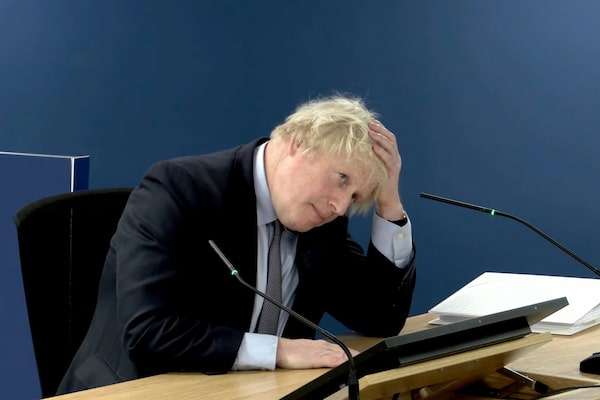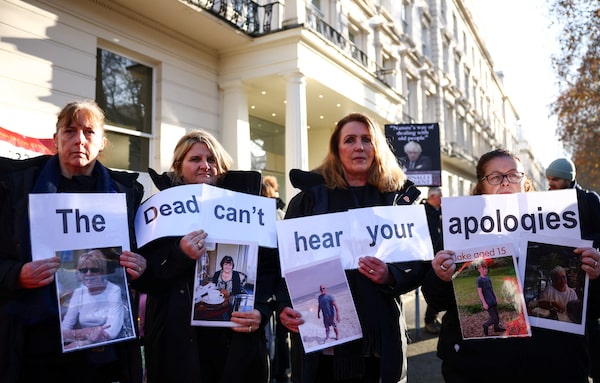
Former British prime minister Boris Johnson testifies during an inquiry into the COVID-19 pandemic, at Dorland House, in London, on Dec. 6.UK Covid-19 Inquiry/The Associated Press
Boris Johnson has never been known for his attention to detail, and even some former top advisers have said he was the wrong person to lead Britain during the COVID-19 pandemic.
But on Wednesday Mr. Johnson offered a spirited defence of his government’s handling of the outbreak, rejecting criticism that he failed to take the virus seriously at first and that he showed a lack of leadership throughout the crisis.
“We may have made mistakes,” Mr. Johnson said at the start of a two-day examination of his decision-making as part of a public inquiry into the pandemic. “We were doing our best at the time given what we knew.”
Mr. Johnson’s appearance at the UK COVID-19 Inquiry had been eagerly anticipated for months. His government set up the public review in 2021 just as Britain was emerging from the worst of the crisis and critics were clamouring for an accounting of his oversight.
The inquiry, headed by retired judge Heather Hallett, didn’t get under way until 2022, and public hearings began last June. Since then, Ms. Hallett has gathered thousands of documents and heard from an array of witnesses, including several former cabinet ministers and senior advisers.
Most of the documents and the witnesses have painted an unflattering portrait of Mr. Johnson’s leadership.
No custom component found for subtype: oovvuu-video
Patrick Vallance, the government’s chief scientific officer throughout the pandemic, described Mr. Johnson as “all over the place” and “completely inconsistent.” He also said Mr. Johnson had argued “for letting it all rip, saying, yes, there will be more casualties, but so be it – they have had a good innings.”
Simon Case, the head of the civil service, said he had “never seen a bunch of people less well equipped to run the country.” Mr. Johnson’s onetime chief adviser, Dominic Cummings, repeatedly referred to the former prime minister as useless and “criminally incompetent,” while former communications director Lee Cain testified, “I think what will probably be clear in COVID, it was the wrong crisis for this prime minister’s skill set.”
Mr. Johnson’s conduct hasn’t helped to improve his legacy. He was forced out of office in 2022 by fellow Conservative MPs after a string of scandals including revelations that more than a dozen parties were held at Downing Street during the pandemic. A parliamentary committee later found that Mr. Johnson deliberately mislead MPs about the social events.
His own notes, revealed by the inquiry, showed that he fretted over introducing restrictions on social movements because he feared they would “destroy everything for people who will die soon.” And in another note he questioned whether long COVID was a medical condition and described it as “bollocks” and “Gulf War Syndrome stuff.”
On Wednesday, Mr. Johnson said he’d done the best he could under the circumstances. He apologized for his comments about long COVID but dismissed repeated suggestions that he failed to address a toxic work culture. Instead he argued that dissension was common at high levels of government and that it reflected healthy disagreements.
“I think the worst vice in my view would have been to have had an operation where everyone was so deferential and so reluctant to make waves that they never expressed their opinion, they never challenged and they never doubted,” he told the hearing.

Protesters hold a placard reading 'The dead can't hear your apologies' outside the building where an inquiry into the COVID-19 pandemic is being held, in London, on Dec. 6.HENRY NICHOLLS/Getty Images
He also refuted figures that indicated Britain had one of the highest totals of excess deaths owing to COVID-19 in Europe, totalling more than 230,000. Other data showed the country had done far better than most countries in Europe, he insisted.
“We have an elderly population, extremely elderly population,” he said. “We do suffer, sadly, from lots of COVID-related co-morbidities and we are a very densely populated country, the second most densely populated country in Europe, and that did not help.”
Mr. Johnson acknowledged that he and other officials underestimated the virus in the first few months of 2020, when it began to spread across Asia and into Europe. “We should have twigged, we should collectively have twigged, much sooner. I should have twigged,” he said.
In a sign of the anger many people still feel toward the former prime minister, a group of families who lost relatives to COVID-19 held a protest at the hearing.
Mr. Johnson tried to address their concerns at the start of the session. “I understand the feelings of these victims and their families and I am deeply sorry for the pain and the loss and suffering,” he said. But just as he finished, four people stood and held sheets of paper that read: “The dead can’t hear your apologies.”
Mr. Johnson will return to the inquiry on Thursday. Prime Minister Rishi Sunak is expected to testify next week. He was chancellor of the exchequer during the pandemic and he also led an internal move to oust Mr. Johnson as Conservative Party leader and prime minister.